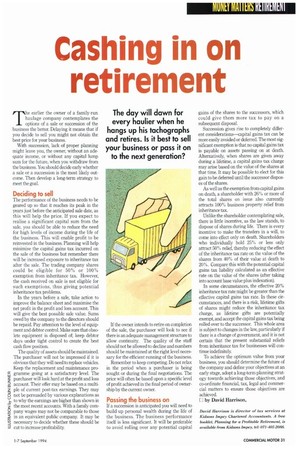Cashing in on retirement
Page 33

If you've noticed an error in this article please click here to report it so we can fix it.
The day will dawn for every haulier when he hangs up his tachographs and retires. Is it best to sell your business or pass it on to the next generation?
The earlier the owner of a family-run haulage company contemplates the options of a sale or succession of the business the better. Delaying it means that if you decide to sell you might not obtain the best price for your business.
With succession, lack of proper planning might leave you, the owner, without an adequate income, or without any capital lump sum for the future, when you withdraw from the business. You should decide early whether a sale or a succession is the most likely outcome. Then develop a long-term strategy to meet the goal.
Deciding to sell
The performance of the business needs to be geared up so that it reaches its peak in the years just before the anticipated sale date, as this will help the price. If you expect to realise a significant capital sum from the sale, you should be able to reduce the need for high levels of income during the life of the business. This will enable profit to be reinvested in the business. Planning will help minimise the capital gains tax incurred on the sale of the business but remember there will be increased exposure to inheritance tax after the sale. The trading company shares could be eligible for 50% or 100% exemption from inheritance tax. However, the cash received on sale is not eligible for such exemptions, thus giving potential inheritance tax problems.
In the years before a sale, take action to improve the balance sheet and maximise the net profit in the profit and loss account. This will give the best possible sale value. Sums owed by the company to the directors should be repaid. Pay attention to the level of equipment and debtor control. Make sure that obsolete equipment is disposed of keep debtor days under tight control to create the best cash flow position.
The quality of assets should be maintained. The purchaser will not be impressed if it is obvious that they will need to replace vehicles. Keep the replacement and maintenance programme going at a satisfactory level. The purchaser will look hard at the profit and loss account. Their offer may be based on a multiple of current post-tax earnings. They may not be persuaded by various explanations as to why the earnings are higher than shown in the most recent accounts. With a family company wages may not be comparable to those in an equivalent public company. It may be necessary to decide whether these should be cut to increase profitability. If the owner intends to retire on completion of the sale, the purchaser will look to see if there is an adequate management structure to allow continuity The quality of the staff should not be allowed to decline and numbers should be maintained at the right level necessary for the efficient running of the business.
Remember to keep competing. Do not relax in the period when a purchaser is being sought or during the final negotiations. The price will often be based upon a specific level of profit achieved in the final period of ownership by the current owner.
Passing the business on
If a succession is anticipated you will need to build up personal wealth during the life of the business. The business performance itself is less significant. It will be preferable to avoid rolling over any potential capital gains of the shares to the successors, which could give them more tax to pay on a subsequent disposal.
Succession gives rise to completely different considerations—capital gains tax can be more easily avoided or deferred. The most significant exemption is that no capital gains tax is payable on assets passing on at death. Alternatively, when shares are given away during a lifetime, a capital gains tax charge may arise based on the value of the shares at that time. It may be possible to elect for this gain to be deferred until the successor disposes of the shares.
As well as the exemption from capital gains on death, a shareholder with 26% or more of the total shares on issue also currently attracts 100% business property relief from inheritance tax Unlike the shareholder contemplating sale, there is little incentive, as the law stands, to dispose of shares during life. There is every incentive to make the transfers in a will, to come into effect only on death. Shareholders who individually hold 25% or less only attract 50% relief, thereby reducing the effect of the inheritance tax rate on the value of the shares from 40% of their value at death to 20%. Compare this with the potential capital gains tax liability calculated as an effective rate on the value of the shares (after taking into account base value plus indexation).
In some circumstances, the effective 20% inheritance tax rate might be greater than the effective capital gains tax rate. In these circumstances, and there is a risk, lifetime gifts of shares might reduce the inheritance tax charge, as lifetime gifts are potentially exempt, and accept the capital gains tax being rolled over to the successor. This whole area is subject to changes in the law, particularly if there is a change of government, and it is not certain that the present substantial reliefs from inheritance tax for businesses will continue indefinitely.
To achieve the optimum value from your business, you should determine the future of the company and define your objectives at an early stage, adopt a long-term planning strategy towards achieving those objectives, and co-ordinate financial, tax, legal and commercial matters to ensure those objectives are achieved.
E by David Harrison,
























































































































